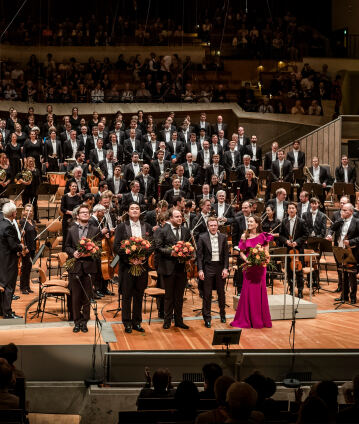Daniel Harding conducts Berlioz’s “Roméo et Juliette”

Although love is the all-encompassing theme in Romeo and Juliet, there are many more emotional states to experience: a gloriously festive atmosphere, the hatred of a family feud and, of course, sadness and horror in the face of a tragic double suicide. In Berlioz’s version – part symphony, part cantata – he captures all of this with drama, opulence and invention. The conductor of this performance is Daniel Harding, who has been exploring the work for many years.
“My dear friend, Beethoven being dead, only Berlioz can make him live again; and I who have heard your divine compositions […] humbly beg you to accept, as a token of my homage, twenty thousand francs.” None other than the violin virtuoso Niccolò Paganini, often described by his contemporaries as miserly, addressed these lines to Hector Berlioz in 1838. He in turn felt honoured and pleased – in his time, he was notoriously broke. He was above all glad about the considerable financial donation. “After paying off my debts, I was still left with a large sum of money, and I thought only of using it for musical purposes,” the composer chronicled in later years. “After hesitating for quite some time, I settled on a symphony with chorus [and] vocal soloists.”
Thus the idea of Roméo et Juliette was born. For seven months, according to his own testimony, Berlioz worked on the piece inspired by Shakespeare’s tragedy, which he named a “Symphonie dramatique” after completing the score. In fact, the composition does not constitute a cantata or opera concertante, but rather is aligned by Berlioz with the tradition of Beethoven’s Ninth Symphony: as a cyclical instrumental composition that expands classical boundaries by using vocal voices. Thus, one can read in the foreword to the score of Roméo et Juliette: “The reason there is singing almost from the start is to prepare the listener’s mind for the dramatic scenes where the feelings and passions are to be expressed by the orchestra.” Putting it simply, one could say today: the programme is not to be read in an accompanying brochure, but rather is composed into the work in the form of solo voices and choir. This also explains why key moments of the Shakespearean action, such as for instance the famous balcony scene, are structured not as operatic vocal numbers, but as instrumental atmospheric pictures. In his memoirs, Berlioz pointed out the difficulties “inherent in the form and in the style” and emphasised that for a performance of Roméo et Juliette one would need above all “first-rate performers”.
And these will without a doubt be mustered when Daniel Harding, who was promoted as a young man by Sir Simon Rattle and Claudio Abbado and is now acclaimed on all concert stages around the world, brings Berliozʼs unique composition to life at the Musikfest Berlin with the Berliner Philharmoniker, the Rundfunkchor Berlin and renowned vocal soloists.
© 2019 Berlin Phil Media GmbH
Related interviews
Artists
Our recommendations
- Christian Thielemann conducts choral works by Johannes Brahms
- Simon Rattle conducts Beethoven and Mendelssohn at the Waldbühne
- Christian Thielemann conducts a concert “à la française”
- Christian Thielemann conducts Beethoven’s “Missa solemnis”
- Marin Alsop conducts depictions of nature
- Simon Rattle conducts Stravinsky and Berio